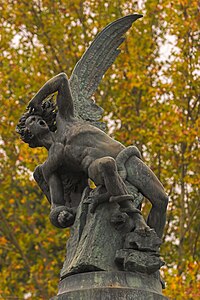Fallen angel

A fallen angel, in Jewish, Christian mythology and Islam (story of Iblis Jinn) is an angel who has been exiled or banished from Heaven. Often such banishment is a punishment for disobeying or rebelling against God (see War in Heaven).
Judaism
The apocryphal Book of Enoch (3rd~2nd Century BCE) recounts that a group of 200 rebellious angels, or Watchers, left heaven and came down to Earth to marry human women and have children with them.[1]
New Testament
Second Epistle of Peter and the Epistle of Jude make mention of fallen angels in the New Testament:
And the angels which kept not their first estate, but left their own habitation, he hath reserved in everlasting chains under darkness unto the judgment of the great day. - Jude 1:6, KJV
The Unitarian Joseph Priestley suggested that the passages refer to Korah.[2] William Graham (1772) suggested that it refered to the spies in Canaan.[3] These passages are generally held today to be commentary, either positive or neutral or negative, on Jewish traditions concerning Enoch circulating in the Early Church.[4]
Early Christianity
From the 5th Century CE literature literature develops about Lucifer, a name frequently attributed to Satan in Christian belief. This usage stems from a particular interpretation of Isaiah 14:3–20 that speaks of someone who is given the name of "Day Star" or "Morning Star" (in Latin, Lucifer) as fallen from heaven. The Latin word lucifer, "shining one", however, does not refer to Satan anywhere in the Bible. Some see the passage as using this name to describe the king of Babylon, who had exalted himself as being deity himself, after which God would cast him down. Similar terminology is used in Ezekiel to describe the king of Tyre. The Greek etymological synonym of Latin lucifer, in the Septuagint of Isaiah 14, Eωσφόρος (Eosphoros, "dawn-bearer")[5][6] is used as the morning star in 2 Peter 1:19 and elsewhere with no reference to Satan.
Satan is called Lucifer in many later writings, notably John Milton's Paradise Lost (7.131-134, etc.), in which Milton writes that Satan was "brighter once amidst the host of Angels, than the sun amidst the stars."[7]
Islam
The Quran states that Satan was an angel and he is addressed as an angel in verses (2:34, 7:11, 15:29, 17:61, 18:50, 20:116, 38:71) prior to his fall. The Quran defines a jinn as a fallen angel [18:50]. The Quran depicts a story of angels given minds of their own with free will found in verse [2:34], of them Iblis (Satan/Lucifer) rebelled and was therefore banished on earth to create mischief amongst mankind. [8]
Prospects for salvation of fallen angels
According to the Catechism of the Catholic Church, angels were all created as good beings, but some decided to become evil.[9] Angels do not need faith as they already have the knowledge of celestial things, which means their action constitutes unforgivable sin.[10] Matthew 12:32 clarifies unforgivable sin as meaning that the sinner is not forgiven in "this age or the age to come." For most Christians this would not mean that those who have committed this sin may be redeemed after the passage of two ages,[11] since "the age to come" (or World to Come) is usually interpreted to mean an eternal period after the eschaton. Some Universalists[12] have suggested that Clement of Alexandria, Origen and Gregory of Nyssa taught that even the Devil and fallen angels will eventually be saved.[13]
References
- ^ Charlesworth Old Testament Pseudepigrapha Vol.1 Doubleday
- ^ The theological and miscellaneous works of Joseph Priestley, Vol.2
- ^ William Graham, An enquiry into the scripture meaning of the word Satan, and its synonimous terms, the devil, or the adversary, and the wicked one. Wherein the notions concerning devils or demons are brought... MA 8vo. is. 6d. Johnson. 1772
- ^ Bauckham
- ^ ScriptureText.com
- ^ φωσφόρος Etymonline.com
- ^ Online-Literature.com
- ^ http://www.submission.org/satan/index.html
- ^ Vatican.va, The Catechism of the Catholic Church, Number 391
- ^ Vatican.ca, The Catechism of the Catholic Church, Number 393
- ^ NewOxfordReview.org. Is Hell Closed Up & Boarded Over?, David Watt, New Oxford Review, February 1999
- ^ Allin, Thomas (1891). Christ Triumphant or Universalism Asserted as the Hope of the Gospel on the Authority of Reason, the Fathers, and Holy Scripture.
{{cite book}}: Cite has empty unknown parameter:|coauthors=(help)[page needed] - ^ Does this source actually say this? Russell, Jeffrey (1981). Satan. Ithaca: Cornell University Press. ISBN 0801494133.[page needed] "A great deal of the vivid elaboration of legend and literature on the Devil's nature arises from Origen's initiative in using these texts.61 The angels fell in the beginning along with Satan, and for the same reason, pride."
Source
 This article incorporates text from a publication now in the public domain: Herbermann, Charles, ed. (1913). Catholic Encyclopedia. New York: Robert Appleton Company.
This article incorporates text from a publication now in the public domain: Herbermann, Charles, ed. (1913). Catholic Encyclopedia. New York: Robert Appleton Company. {{cite encyclopedia}}: Missing or empty|title=(help)
- Hugh Pope "Angels", Catholic Encyclopedia, 1907, 1913.
- Hugh Pope (1907)"Catholic Encyclopedia". New Advent.
Bibliography
- Ashley, Leonard. The Complete Book of Devils and Demons Barricade Books. ISBN 1-56980-077-4
- Bamberger, Bernard Jacob, (March 15, 2006). Fallen Angels: Soldiers of Satan's Realm, 300pp. ISBN 0-8276-0797-0
- Davidson, Gustav, 1994. A Dictionary of Angels: Including the Fallen Angels. Free Press. ISBN 0-02-907052-X
External links
- Catholic Encyclopedia: Angels, see section "The Evil Angels"
- JewishEncyclopedia: Fall of Angels
